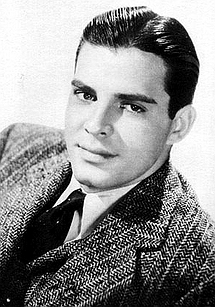به ازای هر نفری که با دعوت شما در منظوم ثبتنام میکنند 20 امتیاز میگیرید.
لینک دعوت:


Kellard remained in New York following this acting stint and became a member of the Stagecraft Theater while continuing to look for other employment. He finally returned to Broadway with a role in "Hitch Your Wagon" in 1937, which earned him a 5-year contract with 20th Century-Fox. Older brother Thomas Kellard also found some unbilled bit roles earlier at Fox in such films as The Little Colonel (1935). Robert himself started out just as uneventfully with uncredited bits in Second Honeymoon (1937) and Annapolis Salute (1937). From there he progressed to more interesting parts in Island in the Sky (1938) and Time Out for Murder (1938) starring Michael Whalen and Gloria Stuart in which he played murder suspects. He rose in rank to Jean Rogers' love interest in the films Always in Trouble (1938), While New York Sleeps (1938) and Stop, Look and Love (1939), but his career soon stalled with more bit parts mixed in.
Kellard freelanced in 1940, working for Republic in the serials Drums of Fu Manchu (1940) in which he played adventure hero Allan Parker, and in King of the Royal Mounted (1940) in support to Allan Lane as ill-fated aide-de-camp Corporal Tom Merritt. He then went on to serviceable secondary supports in Phantom of Chinatown (1940), _Prairie Pioneers (1941) and Gentleman from Dixie (1941), in addition to a square-jawed lead in Escort Girl (1941). He appeared for a time on the stage until signing with Columbia in 1942. The studio changed his name to Robert Stevens but it didn't help things. Primarily in second-string parts, his sole lead was in another stalwart serial, Perils of the Royal Mounted (1942), as Sgt. Mack MacLane.
Robert joined the Navy during WWII and stayed for nearly four years. He returned to Columbia in late 1945 but, again, found little except for unbilled parts in such "B" fare as The Return of Rusty (1946) and The Millerson Case (1947) and a few Three Stooges shorts. Although he managed to earn one more rugged lead with the serial Tex Granger: Midnight Rider of the Plains (1948), the writing was on the wall. He turned to TV in the 1950s and served as an actor/writer and dialogue director on The Lone Ranger (1949) series, before leaving acting permanently and joining the Merchant Marines. He later moved into sales work as a rep for Showcase Films and also did some writing. He suffered from prostate cancer in later years and died at age 65 of complications from pneumonia on January 13, 1981.